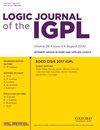电能消耗预测的机器学习:在巴拉圭系统中的应用
IF 0.8
4区 数学
Q2 LOGIC
引用次数: 0
摘要
在本文中,我们使用一种时间序列预测方法来解决短期电能预测问题,该方法适用于巴拉圭一家配电供应商生成的数据。这项工作中使用的数据集包含三年期间收集的数据。这是首次使用这些数据,因此还对数据进行了预处理。我们特别提出了对各种机器学习和统计策略的比较研究,目的是利用历史数据预测给定预测范围(在我们的案例中为七天)内的电能消耗。在本文中,我们测试了使用不同历史窗口大小的技术的有效性。具体来说,我们考虑了两种组合策略、一种神经网络、一种深度学习技术和线性回归。此外,在本研究中,我们还测试了气象数据的加入是否有助于实现更好的预测。特别是,我们考虑了三年数据收集期间登记的温度、湿度、风速和气压数据。结果表明,一般来说,深度学习方法能获得最佳结果,而在同时考虑气象数据时也能获得这样的结果。此外,在使用气象数据时,需要较小的历史窗口大小才能获得精确预测。本文章由计算机程序翻译,如有差异,请以英文原文为准。
Machine learning for electric energy consumption forecasting: Application to the Paraguayan system
In this paper we address the problem of short-term electric energy prediction using a time series forecasting approach applied to data generated by a Paraguayan electricity distribution provider. The dataset used in this work contains data collected over a three-year period. This is the first time that these data have been used; therefore, a preprocessing phase of the data was also performed. In particular, we propose a comparative study of various machine learning and statistical strategies with the objective of predicting the electric energy consumption for a given prediction horizon, in our case seven days, using historical data. In this paper we have tested the effectiveness of the techniques with different historical window sizes. Specifically, we considered two ensemble strategies, a neural network, a deep learning technique and linear regression. Moreover, in this study, we tested whether the inclusion of meteorological data can help achieve better predictions. In particular, we considered data regarding temperature, humidity, wind speed and atmospheric pressure registered during the three-year period of data collection. The results show that, in general, the deep learning approach obtains the best results and that such results are obtained when meteorological data are also considered. Moreover, when meteorological data is used, a smaller historical window size is required to obtain precise predictions.
求助全文
通过发布文献求助,成功后即可免费获取论文全文。
去求助
来源期刊
CiteScore
2.60
自引率
10.00%
发文量
76
审稿时长
6-12 weeks
期刊介绍:
Logic Journal of the IGPL publishes papers in all areas of pure and applied logic, including pure logical systems, proof theory, model theory, recursion theory, type theory, nonclassical logics, nonmonotonic logic, numerical and uncertainty reasoning, logic and AI, foundations of logic programming, logic and computation, logic and language, and logic engineering.
Logic Journal of the IGPL is published under licence from Professor Dov Gabbay as owner of the journal.

 求助内容:
求助内容: 应助结果提醒方式:
应助结果提醒方式:


